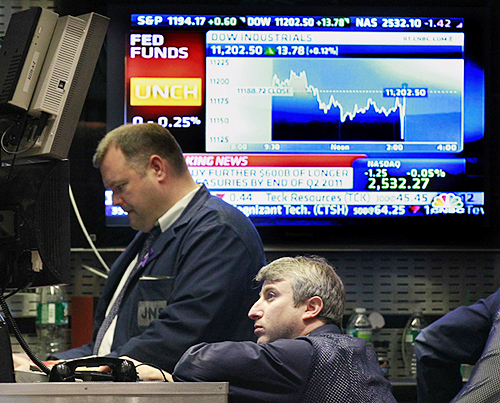|
 |
|
BUY MORE BONDS: Traders work on the floor of the New York Stock Exchange as a screen shows The Federal Reserve rate announcement, November 3, 2010. The Federal Reserve launched a controversial new policy on Wednesday, committing to buy $600 billion more in government bonds by the middle of next year in an attempt to breathe new life into a struggling U.S. economy (XINHUA/REUTERS) |
The U.S. Federal Reserve's recent injection of $600 billion into the global banking system has resulted in a great deal of condemnation. The action marked the second time in a year that the Fed has ventured into new territory as it struggles to keep down long-term interest rates in order to encourage economic growth.
United States Secretary of the Treasury Timothy Geithner was quoted by Bloomberg as saying "What is driving the flow of capital you're seeing into emerging markets is fundamentally a positive reflection of confidence in the likely trajectory of growth rates in those countries over time."
The influx of capital into Asia "seems to me reasonable; it's rational, not surprising, and fundamentally desirable compared to the alternative," he told the Singapore-based The Straits Times newspaper.
Ignoring the condemnations of the international community, the U.S.'s new monetary policy has damaged the global market, especially in developing countries. The U.S.'s recovery has been slow and its unemployment rate has been dismal as well. However, the reasons for these problems are low consumption and poor marketing, not the afflux of money.
The United States has lowered long-term interest rates and produced money without restraint. However, this will neither help to strengthen domestic production nor improve its economy. The money they are injecting into the global market will ultimately cause more problems. Countries like the United States, Japan and some European countries have seen their currencies drop in value. This causes refugee capital to flow to developing countries where the money increases in value, damaging the economies of those countries.
The U.S.'s newest currency policy will cause the dollar to fall even farther in value. This will cause the price of commodities associated with the dollar to rise, resulting in the inflation of global assets and ultimately bringing the world closer to a new round of financial crises.
Developing countries, particularly China, will be the biggest victims of this new policy. Producing money without restraint will further drive down the dollar and increase American exports, which will threaten developing nations whose economies largely rely on exports.
The dollar is a global currency; many countries' foreign exchange reserves are based around it. Lowering the value of the dollar means that these countries' reserves will be ravaged. China has the largest reserves of dollars in the world; it will suffer the most from the Federal Reserve's latest policy. The quantitative easing policy will be a disaster for the global economy; the theory that refugee capital will benefit developing nations is fundamentally flawed.
The United States has often been proud to present its open market and liberalized trade to other countries. However, it seems now that their policies and ideals are nothing but selfish. When national interests and the interests of other countries are in conflict, the U.S. always abandons the countries that it claims to be looking out for. It is hard to believe that a country like this can be considered to be a world leader.
China cannot afford to ignore this new monetary policy. At least three specific steps should be taken to combat its effects. First, China should intervene in the foreign exchange market to ensure the stability of the yuan, imitating market-oriented countries such as Japan.
Next, China should strengthen the management of its capital account. China could learn a lesson from Brazil and the European Union by imposing financial trade taxes; these taxes would be paid by foreign investors involved in the loan and finance industries.
Finally, China should pay closer attention to U.S. monetary policy, lest they attempt to use the same containment strategies against China that they used against Japan in the 1980s.
(Source: Xinhuanet.com) | 